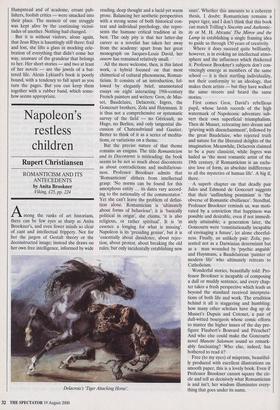Napoleon's restless children
Rupert Christiansen
ROMANTICISM AND ITS ANTECEDENTS by Anita Brookner Viking, £25, pp. 224 Among the ranks of art historians, there can be few eyes as sharp as Anita Brookner's, and even fewer minds so clear of cant and intellectual frippery. Not for her the jargon of Gestalt theory or the deconstructed image; instead she draws on her own free intelligence, informed by wide reading, deep thought and a lucid yet warm prose. Balancing her aesthetic perspectives with a strong sense of both historical con- text and individual psychology, she repre- sents the humane critical tradition at its best. The only pity is that her latter-day career as a novelist has taken her away from the academy: apart from her great monograph on Jacques-Louis David, her oeuvre has remained relatively small.
All the more welcome, then, is this latest work, a hybrid focused on that most chimerical of cultural phenomena, Roman- ticism. It consists of an introduction, fol- lowed by elegantly brief, unannotated essays on eight interacting 19th-century French painters and writers: Gros, de Mus- set, Baudelaire, Delacroix, Ingres, the Goncourt brothers, Zola and Huysmans. It is thus not a comprehensive or systematic survey of the field — no Gericault, no Hugo, no Berlioz, and only tangential dis- cussion of Chateaubriand and Gautier. Better to think of it as a series of medita- tions, or variations on a theme.
But the precise nature of that theme remains an enigma. The title Romanticism and its Discontents is misleading: the book seems to be not so much about discontents as about contradictions and multifarious- ness. Professor Brookner admits that `Romanticism' slithers from intellectual grasp: 'No norms can be found for this amorphous entity ... its dates vary accord- ing to the nationality of the commentator.' Yet she can't leave the problem of defmi- don alone. Romanticism is 'ultimately about forms of behaviour'; it is 'basically political in origin', she claims, 'it is also religious, or rather spiritual'. It is 'in essence a longing for what is missing'. Napoleon is its 'presiding genius', but it is `essentially about dissidence, about rejec- tion, about protest, about breaking the old rules, but only incidentally establishing new Delacroix's 'Tiger Attacking Horse'. ones'. Whether this amounts to a coherent thesis, I doubt: Romanticism remains a paper tiger, and I don't think that this book can match Trilling's Sincerity and Authentic- ity or M. H. Abrams' The Mirror and the Lamp in establishing a single framing idea to guide us through 150 years of creativity.
Where it does succeed quite brilliantly, however, is in evoking an intellectual atmo- sphere and the influences which thickened it. Professor Brookner's subjects don't con- vincingly emerge as members of the same school — it is their startling individuality, not their conformity to an ideology, that makes them artists — but they have walked the same streets and heard the same stories.
First comes Gros, David's rebellious pupil, whose lavish records of the high watermark of Napoleonic adventure sub- vert their own superficial triumphalism. Then de Musset, retreating into dream and `grieving with disenchantment', followed by the great Baudelaire, who rejected truth and nature for the liberated delights of the imagination. Meanwhile, Delacroix claimed to be a pure classicist, while Ingres was hailed as 'the most romantic artist of the 19th century, if Romanticism is an exclu- sive love of form, an absolute indifference to all the mysteries of human life'. A big if, there.
A superb chapter on that deadly pair Jules and Edmond de Goncourt suggests that their 'unflinching pessimism' is 'the obverse of Romantic ebullience'. Stendhal, Professor Brookner reminds us, was moti- vated by a conviction that happiness was possible and desirable, even if not immedi- ately attainable; a generation later, the Goncourts were 'constitutionally incapable of envisaging a future', let alone cheerful- ness. Finally, an unlikely pair: Zola, pre- sented not as a Darwinian determinist but as a man wounded by 'psychic anguish' and Huysmans, a Baudelairean 'painter of modern life' who ultimately retreats to Catholicism.
Wonderful stories, beautifully told: Pro- fessor Brookner is incapable of composing a dull or muddy sentence, and every chap- ter takes a fresh perspective which leads us beyond the standard received interpreta- tions of both life and work. The erudition behind it all is staggering and humbling: how many other scholars have dug up de Musset's Dupuis and Cotonet, a pair of dull-witted bourgeois whose comic efforts to master the higher issues of the day pre- figure Flaubert's Bouvard and Pecuchet? And who else could make the Goncourts' novel Manette Salomon sound so remark- ably fascinating? Who else, indeed, has bothered to read it?
Free (to my eyes) of misprints, beautiful- ly produced with excellent illustrations on smooth paper, this is a lovely book. Even if Professor Brookner cannot square the cir- cle and tell us decisively what Romanticism is and isn't, her wisdom illuminates every- thing that goes under its name.


























































 Previous page
Previous page